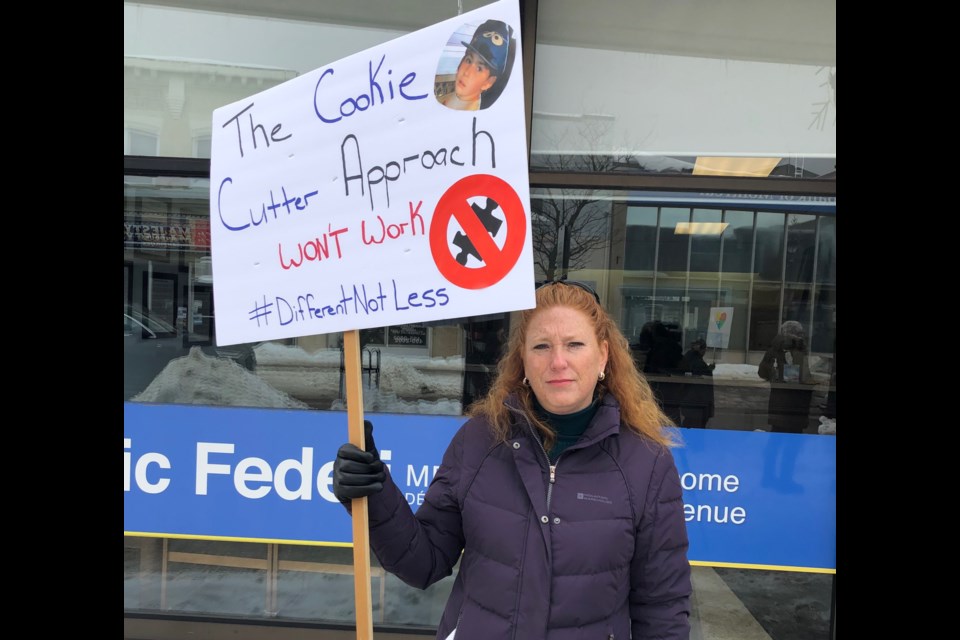By Bob Pipe.
A crowd of 60 people gathered outside Nipissing MPP Vic Fedeli’s constituency office in North Bay at noon on Friday, to protest changes to the province’s autism spectrum funding model.
Kim Kelly-Cyr carried a placard reading “The Cookie Cutter Approach Won’t Work” and spoke at the rally of her experiences working to raise her 11-year old son, Terran, who is at the more severe end of the autism spectrum.
“Even though the existing system is broken, this model is not a fix. It does not help families and it will make it worse,” she said. “My son is non-verbal and has been hospitalized for self-harm and harming others and he requires intensive therapy. The new funding model wouldn’t cover a quarter of the actual costs.
"I’m extremely fearful for my son and for all the families in the North. The government cannot download their responsibility. With this program, they are hurting every family, even those who don’t have children on the autism spectrum, because of what our children and families are going to take from the health system and the education system.”
The funding changes, announced in early February by Children, Community and Social Services Minister Lisa MacLeod, signal a shift from needs-based funding to an age-based funding model, with funding for treatment going directly to families instead of regional service providers.
It includes up to $140,000 for a child in treatment from age two to 18. Available funding amounts would also be tied to family income. The new model intends to create more timely diagnostic assessments so that children can get off the waitlist and access services.
See: Autism protest planned for Friday
One of the organizers is Lindsay Voisin, who has a sister diagnosed on the severe end of the autism spectrum, the rally featured chants of "We Deserve Better" and "We Are United," as well as speeches highlighting the lived experiences of families working to raise children on the autism spectrum. Horns from passing cars frequently punctuated the speeches in support for the rally.
“We are here in support of families and children on the autism spectrum. We are here to fight for their right to access services,” said Voisin. “Autism is a spectrum disorder and it is not being treated as such. This is not an equitable program and not an equitable funding model for a spectrum disorder that doesn’t have equity.
"The reality is that the clinically proven treatments and interventions are expensive and the money that the government has said they would provide at the maximum, $140,000 in total, barely scratches the surface of what some of these families will require.”
Kelly-Cyr estimates that out of pocket costs to care for her son amount to about $10,000 to $15,000 each year, but highlights that her family has also been lucky in the past with the opportunity to access services through Hands: The Family Help Network, One Kids Place, Community Counselling Centre, and the hospital.
“However, I’m a very active parent and I don’t take no for an answer,” she said. “Unfortunately, families are so taxed with their own lives, working full-time trying to help their families, trying to help their children, and they just don’t know where to turn because there is nowhere to turn.”
Kelly-Cyr is a co-founder of the local organization PLAYS, which works to provide youth on the autism spectrum and their families with equal opportunities to participate in activities and programs and to provide autism awareness and advocacy in the community.
“The biggest issue that we saw was that under the previous government, 23,000 children received zero funding and that is patently unfair. It is unconscionable that it got to that,” said Fedeli when asked to comment following the rally. “We took the existing $256 million that was allocated to autism spectrum funding and increased it to $321 million to be used over the next 18 months to take those 23,000 children who got nothing and get them off the waitlist. We feel this is fair, equitable and sustainable.”
Reforms to the Ontario Autism Program is raising hope that it will restore fairness, equality, and sustainability to the program said the government.



